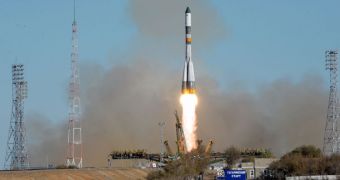On Sunday, October 30, the Russian-built Progress 45 spacecraft launched from the Baikonur Cosmodrome, in Kazakhstan. After spending about three days in low-Earth orbit, the capsule managed to dock to the International Space Station (ISS) earlier today.
The maneuver took place at around 7:41 am EDT (1141 GMT), as the two spacecraft were flying above northern China. Expedition 29 astronauts were not forced to interfere with the process, since everything went smoothly along.
Progress capsules dock to the ISS automatically, but astronauts can decide to take control over the robotic spacecraft, and guide them to their respective docking berths manually. Over the years, there were several instances in which this happened, Space reports.
What makes this mission so important is the fact that it represents the first Progress flight aboard a Soyuz delivery system since the August 24 accident that led to the loss of the Progress 44 capsule.
After the event, the Russian Federal Space Agency (RosCosmos) grounded all Soyuz rockets, pending the results of an investigation. The study determined that a human error was to blame for the launch failure, rather than an intrinsic problem with the booster itself.
Regardless, officials watched as the new rocket was soaring to the sky on Sunday with great anticipation. A failure in late October would have had far-reaching consequences over Russian and international space programs.
For starters, RosCosmos would have had to ground its rockets again, preventing the launch of three astronauts to space in early November. This is the replacement crew for the Expedition 29 astronauts currently aboard the ISS, who need to return home in mid-November.
A delay in the Soyuz launch would have left the ISS unmanned for the first time in about 11 years. For these reasons, space agencies involved in the ISS Program watched the Baikonur event with great concern. The mission went on better than expected.
The capsule carried 1,635 pounds (741 kilograms) of propellant, 110 pounds (50 kg) of oxygen, 926 pounds (420 kg) of water and 3,108 pounds (1,409 kg) of spare parts, maintenance equipment and experiment supplies for the ISS crew.
“After the accident during the launch of a Progress cargo vehicle a couple months ago, there's been some uncertainty in the program. This is a really huge step. This helps clear the rocket of any underlying problems, and so the next Soyuz crew has already gone to Baikonur,” NASA astronaut Mike Fossum said after the new mission launched.

 14 DAY TRIAL //
14 DAY TRIAL //